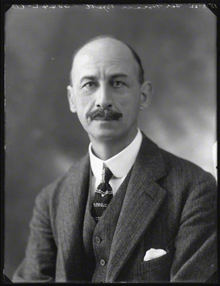Horace Byatt
Sir Horace Archer Byatt GCMG (22 March 1875[1] – 8 April 1933)[2] was a British colonial governor. In the early part of his career he served in Nyasaland, British Somaliland, Gibraltar and Malta. Later, he served in British East Africa, becoming the first governor of the British mandate of Tanganyika. He was then the governor of Trinidad and Tobago.
Sir Horace Byatt | |
|---|---|
 Sir Horace (Archer) Byatt by Bassano. Whole-plate glass negative, 15 August 1922 | |
| Commissioner of British Somaliland | |
| In office July 1911 – 1914 | |
| Preceded by | William Henry Manning |
| Succeeded by | Geoffrey Francis Archer |
| Governor of Tanganyika | |
| In office 22 July 1920 – 20 July 1922 | |
| Preceded by | Heinrich Schnee (German East Africa) |
| Succeeded by | Donald Cameron |
| Governor of Trinidad and Tobago | |
| In office 22 November 1924 – 1929 | |
| Preceded by | Samuel Herbert Wilson |
| Succeeded by | Alfred Claud Hollis |
| Personal details | |
| Born | 22 March 1875 Tottenham, Middlesex, United Kingdom |
| Died | 8 April 1933 (aged 58) London, United Kingdom |
| Spouse(s) | Olga Margaret Campbell |
Biography
Byatt was born 22 March 1875 in Tottenham, Middlesex to school teacher Horace Byatt M.A., of Midhurst, Sussex (where he taught H. G. Wells at Midhurst Grammar School)[3] and Laura (née Archer).[4] He attended Lincoln College, Oxford, obtaining a Bachelor of Arts degree in 1898.[4] Following university, he began a career in the Colonial Service. In 1898 he began working in Nyasaland (what is now Malawi), and in 1905, he went to British Somaliland. He was appointed commissioner and commander-in-chief of British Somaliland in 1911, serving until 1914, when he became Colonial Secretary in Gibraltar.[4] From 1914 to 1916 he was lieutenant-governor and Colonial Secretary of Malta.[5]
From 1916 he was an administrator in British East Africa, and in 1920 he became the first governor of the new British mandate of Tanganyika.[6] In Tanganyika he was responsible for the transfer of power between the Germans and the British, following World War I. Byatt was noted as a liberal governor with sympathies towards African interests.[7] He was governor and commander in chief of Trinidad and Tobago between 1924 and 1929.[8]
Personal life
He married Olga Margaret Campbell of Argyll in 1924 and they had three sons:[9]
- Sir Hugh Campbell Byatt KCVO CMG (1927-2011), British ambassador to Angola and Portugal,[10]
- Ronald (Robin) Archer Campbell Byatt (1930-2019), British diplomat, High Commissioner in Zimbabwe and New Zealand, Ambassador to Morocco[11]
- David Byatt (born 1932).
Horace Byatt died 8 April 1933 in London, aged 58.[4]
Byatt's Bush Squirrel (Paraxerus vexillarius var. byatti), a rodent endemic to Tanzania, was named after Byatt.[12]
References
- "The Oxford Dictionary of National Biography". 2004. doi:10.1093/ref:odnb/38477.
- "Past Governor of Trinidad and Tobago Sir Horace Byatt".
- Experiment in Autobiography. Discoveries and Conclusions of a Very Ordinary Brain, H. G. Wells, 1934, pg 108
- Furley, Oliver (2004). "Byatt, Sir Horace Archer (1875–1933)". Oxford Dictionary of National Biography. Oxford University Press. doi:10.1093/ref:odnb/38477.
- "No. 29011". The London Gazette. 18 December 1914. p. 10815.
- Taylor, James Clagett (1963). The Political Development of Tanganyika. Stanford University Press. pp. 43. ISBN 0-8047-0147-4.
- Mohiddin, Ahmed (1981). African Socialism in two Countries. Taylor & Francis. p. 42. ISBN 0-389-20170-7.
- Hill, Robert A.; Garvey, Marcus (2006). The Marcus Garvey and Universal Negro Improvement Association Papers: Africa for the Africans, 1923–1945. University of California Press. p. 462. ISBN 0-520-24732-9.
- Dewar, Peter Beauclerk (2001). Burke's Landed Gentry of Great Britain. Burke's Peerage. p. 161. ISBN 0-9711966-0-5.
- "Obituary: Sir Hugh Campbell Byatt KCVO CMG". The Scotsman. Retrieved 30 September 2017.
- Europa Publications (2003). The International Who's Who 2004. Routledge. p. 257. ISBN 1-85743-217-7.
- Beolens, Bo; Watkins, Michael; Grayson, Michael (2009). The Eponym Dictionary of Mammals. JHU Press. p. 67. ISBN 978-0-8018-9304-9.